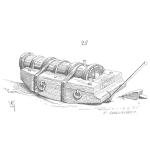
My wife and I were in Firestone-Walker Brewery (Buellton, California) after Solvang Danish Days. (That’s me playing in the Solvang Village band.) My wife was comparing an Adam Firestone photo on the wall with a man at a table. I was admiring a woman seated near the bar with balletic posture. The balletic woman picked up a pizza and delivered it to the man and sat with him. My wife went over and asked the man if he was Adam Firestone? He was, with his sister Polly. While my wife chatted with them, I did not engage, because I was responsible for FORD recalling the Firestone tire sizes that Firestone did NOT recall. [Read more…]












